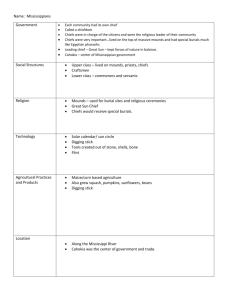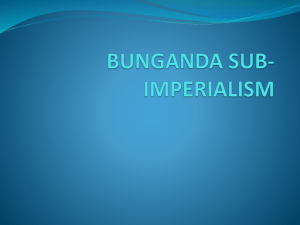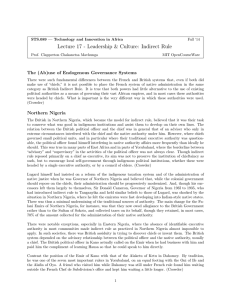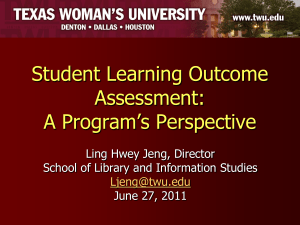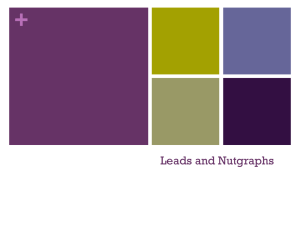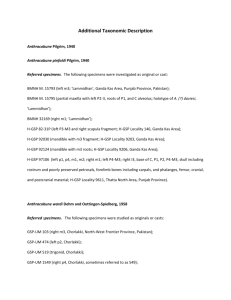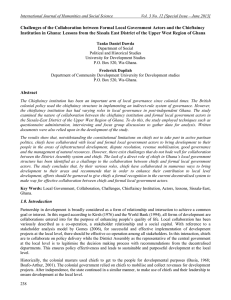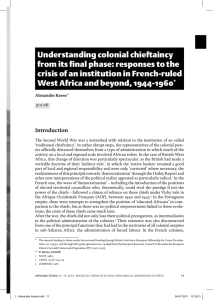COLONIAL ADMINISTRATION
advertisement
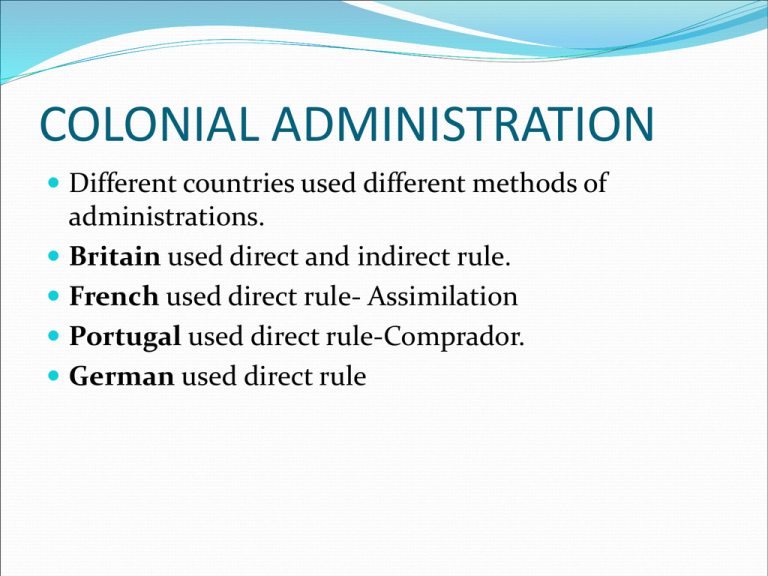
COLONIAL ADMINISTRATION Different countries used different methods of administrations. Britain used direct and indirect rule. French used direct rule- Assimilation Portugal used direct rule-Comprador. German used direct rule CHARTERED COMPANIES Initially the European powers started to rule after partition through the chartered companies e.g. Imperial British East Africa Company- Kenya and Uganda, under William Mackinnon. Royal Niger Company in West Africa under Sir. George Goldie. De Beers Company in South Africa under Cecil Rhodes. German East Africa Company in Tanganyika. Companies were used to exploit African resources Company officials were Brutal and corrupt pocketed the money and made colonies bankrupt Chartered companies Never consulted the home governments, Many were incompetent and unskilled. Many colonial powers had underestimated the costs of running the colonies. Hence companies found it expensive . To cut down on the costs the Countries moved in to administer the colonies directly. Early administrators were sons of rich men in their various countries especially Britain many were Oxbridge products (Oxford and Cambridge graduates- full of themselves) BRITISH RULE IN AFRICA It differed in regions-Egypt & South Africa –direct rule. Mostly they used indirect rule. Using the existing Political Institutions. Case studies British used indirect rule in East Africa -Uganda where the Buganda chiefs were used to rule the Bunyoro, Acholi, Lango and the Karamoja people . British established rule in Acholi later in 1909 and so Acholi lagged behind in development e.g. in education. and the area is today disturbed -lords resistance army of Alice Lakwena. Structure of British indirect system Colonial Office Governor of the colony Secretary of state Provincial Commissioner. District Commissioner. District Officers. Traditional /Warrant chiefs Village headmen. Administration. British divided the territories into Provinces, Districts and locations. Reasons for indirect rule. 1. Colonialism on the Cheap 2. Paternalistic nature- Believed Africans were not capable of ruling themselves e.g. they were “half devils half child” so had to be placed under tutelage. 3. Believed that the process of civilization had to be given in doses to avoid African being detribalized and “swollen headed” Africans not to be cut off from their roots hence created reserves where ethnic groups were confined so they planted the seeds of tribalism. Administration British used chiefs to do their dirty work Collect taxes which they overcharged since before 1914 they were not paid. They maintained law and order. Recruited people for communal labor and as carrier corps during the World Wars. Chiefs provided livestock and grain for the war during the war to feed the troops. Were used to pass unpopular policies e.g. compulsory labor. So Chiefs were hated. Administration Type of rule was exploitative-Africa was mined very quickly. The rule was abusive. There was no technological transfer in exchange of solid minerals and raw materials. Thus Pax Britannica (pacification) was based on “Westernization without Modernization” Subsidies were given from London only to pay colonial administrators. Thus the Dual Mandate (develop colony and Metropole) was a failure. British rule intensified existing tensions and civil wars that had prevailed in Africa. Reaction to indirect rule. Nyangire Rebellion Took place in Bunyoro in Uganda Nyoro people not happy with Ganda chiefs. Rebellion broke out, the people refused the chiefs due to: Refused to pay taxes to the Ganda who overcharged them and became rich at their expense Ganda took their land. Hated use of Ganda language Ganda seen as subimperialists. Ganda chiefs were beaten and houses burnt British rule in West Africa They used the Sokoto Caliphate that had a centralized political .system under a caliph and ruled with help of Emirs-governors. Hence used them to rule the various parts in Nigeria. Left the Emir use the Kadhi courts However they started to erode the powers of the Caliph. The Igbo refused to be ruled and posed a serious challenge it was much later in 1940s that the Igbo were contained. Indirect rule created the current problem in Nigeria and Sudan. Sudan was ruled indirectly by the Egyptians who left rule to the Arabized North. What is happening in Darfur is a political genocide clothed in ethnicity. While what happened in Southern Sudan was a political and religious Genocide. Legacy of British Indirect rule
